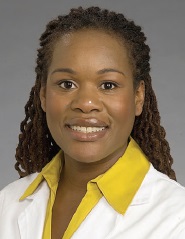Q&A: Brigham PA Shares Passion for Profession, Education
National Physician Assistant (PA) Week is held every October to honor physician assistants’ substantial role in improving health. PAs are involved in nearly every facet of care at BWH.

Chioma Tomlinson
Chioma Tomlinson, MMS, PA-C II, who practices Internal Medicine and Primary Care at Brigham Circle Medical Associates, is one PA making a difference in the lives of patients, colleagues and trainees.
“Having had the good fortune of watching Chioma practice and teach medical trainees, I’m struck by how effective she is at immediately establishing rapport,” said Charles Morris, MD, MPH, associate chief medical officer and an attending physician at Brigham Circle Medical Associates. “She was the first PA in our practice, so she often was introducing not only herself in the exam room but also her profession. Her ability to quickly forge a connection is a skill at which she excels and then leverages to provide a superlative level of care.”
In this Q&A, Tomlinson shares why she loves her job and her commitment to helping educate the next generation of PAs.
What’s your favorite part of your work?
CT: Our team-based approach. It’s a pleasure for me to get to know many of our patients almost as well as their physician does. This dynamic helps us provide better continuity of care. It’s a privilege to be there as someone who can step in and is as invested in the patient’s overall health as their physician when issues arise that need immediate attention or that require frequent visits.
Why did you choose primary care?
CT: I value the relationships we have with our patients in primary care. Our ability to consistently provide quality care for any number of medical and/or psychosocial issues is often tethered to our ability to establish caring and trusting relationships. One example is management for illnesses such as hypertension and diabetes. Staying healthy for these patients often requires not only regularly taking medication but also making significant lifestyle modifications. I try to find common ground and talk to patients about how we can help them live their best lives.
 You’re also a preceptor. What do you enjoy about educating PA students?
You’re also a preceptor. What do you enjoy about educating PA students?
CT: I love what I do and enjoy sharing that fulfillment with students. I’m fortunate in that I teach students from a few local programs. It’s a nice opportunity to give back to the community that has given me so much. It’s inspiring to remember how much we learn during those didactic years and how stressful – but exciting – that time can be. I also like challenging students to think through the many ethical and professional issues in medicine and how they impact our practice as PAs.
What’s your advice for new PAs and PA students?
CT: It’s important for all of us to make sure our profession stays strong by honoring those who came before us, supporting those around us and fostering those who come after us. I encourage PAs to find a meaningful way to stay active in our community. Teaching, publishing, advocacy or trailblazing new opportunities are just a few examples of ways to stay engaged. Lastly, take pride in the fact that we’re part of a larger medical community with the common goal of providing the best care for our patients.

Leave a Reply